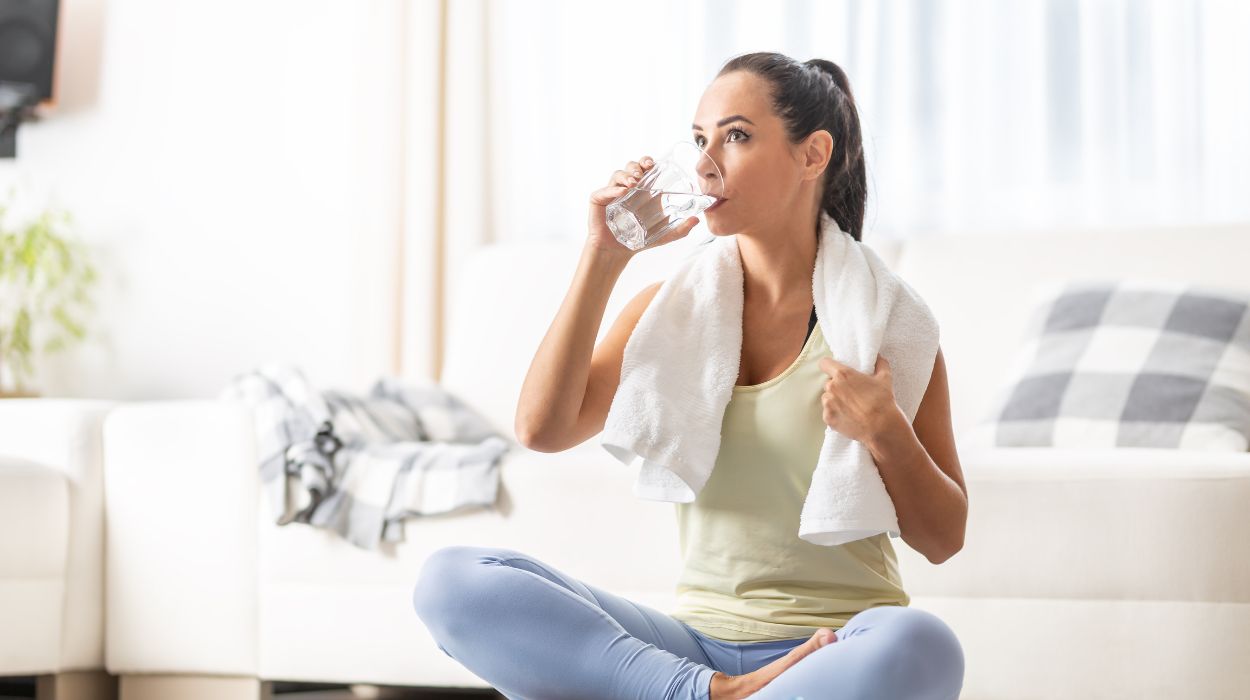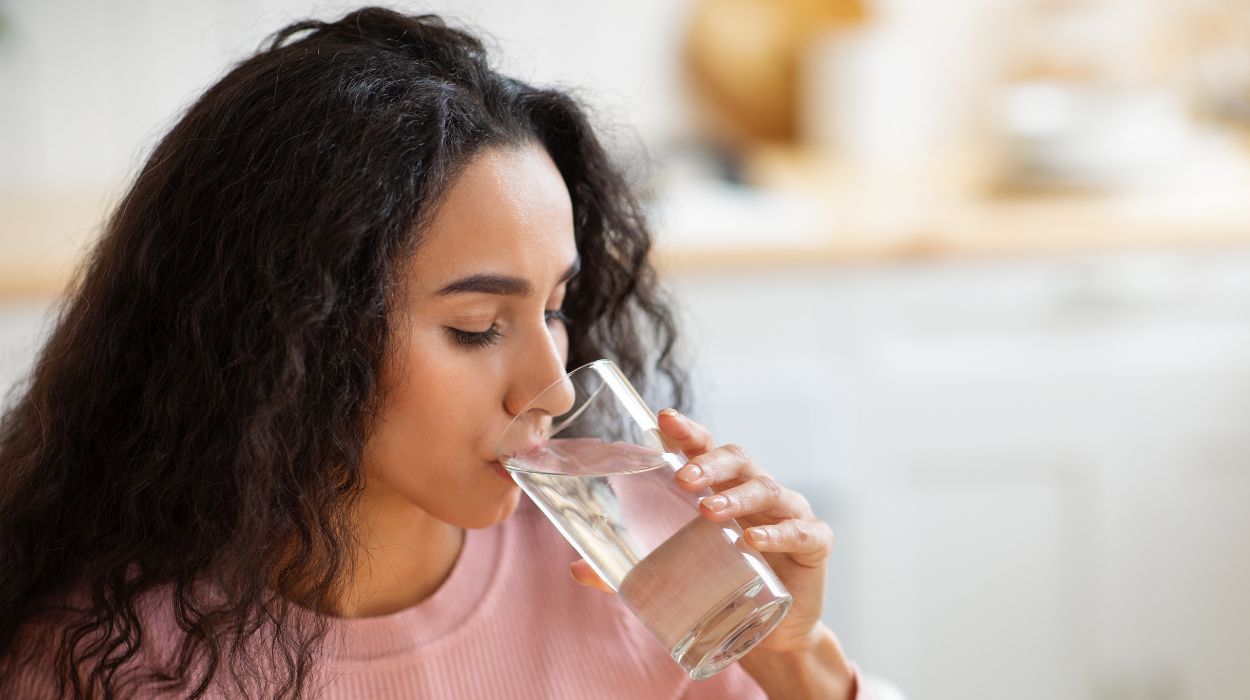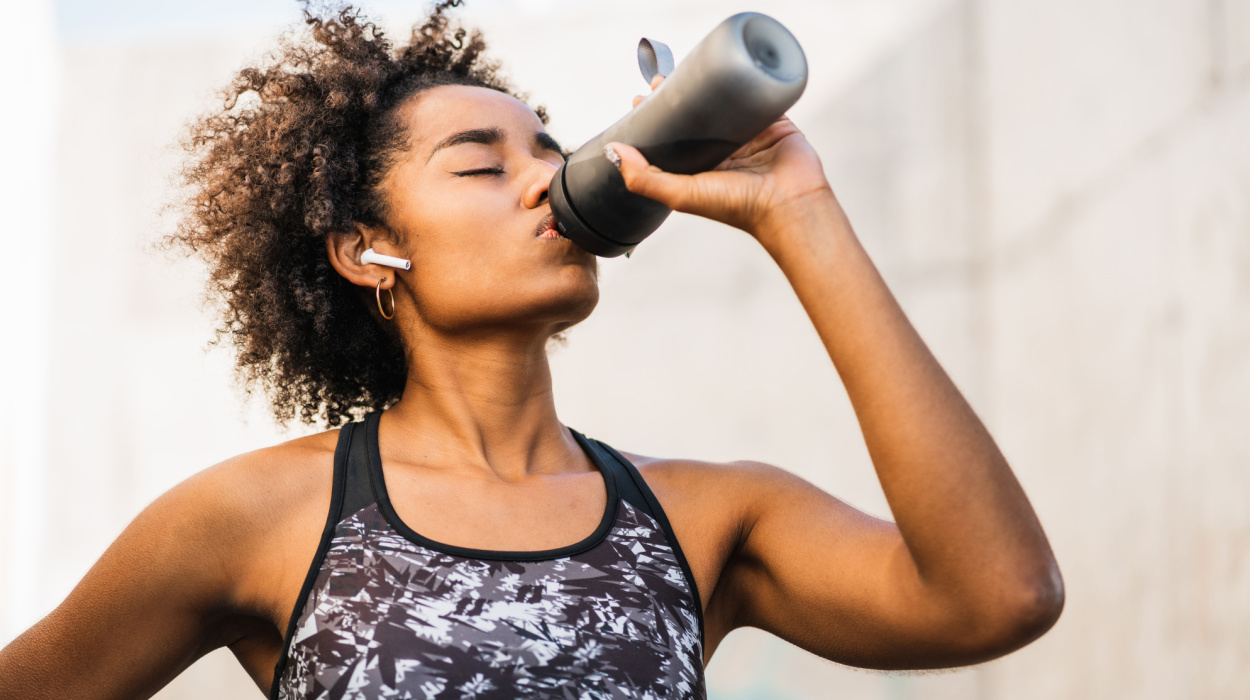It’s commonly understood that a healthy diet and regular exercise[1] routine can help individuals lose weight. But what about hydration? Does drinking water help you lose weight?
The short answer is yes. Consuming excess water[2] has been shown to reduce body weight, body fat, and appetite.
Water plays a crucial function in other aspects of health, as well, such as digestion[3] and mood.[4] These aspects, though not directly related to weight loss, may help increase weight loss success. This article will explain the benefits of water for weight loss and answer the question, “Why does drinking water help you lose weight?”
Does Drinking Water Help You Lose Weight?
Yes. While drinking water may not directly initiate weight loss, it can help boost metabolism and decrease appetite. Additionally, drinking adequate water can help improve energy and exercise performance, assisting in weight loss.
Can Drinking Water Help You Lose Weight?
Yes. Drinking water, though not directly responsible for weight loss, can aid in the weight loss process. One study[2] found that consuming large amounts of water for eight weeks led to a decrease in weight, body mass index, and body fat, as well as a reduction in appetite.
In animal studies, increased hydration[5] was also linked to weight loss. However, not everyone will achieve weight loss in eight weeks, even with excess water consumption. You should allow for weight loss to happen gradually over several months.
Replacing diet beverages with plain water can be a healthy option to increase water intake in addition to a healthy diet.
For example, water helps regulate body temperature[6] and keep joints lubricated. By regulating body temperature and keeping joints flexible, water can support efforts to work out and eat healthfully. Conversely, when dehydrated,[7] we may feel weak and unmotivated, hindering weight loss. Meanwhile, being hydrated can increase motivation and stamina.
Drinking more water may also increase[8] resting energy expenditure, the body’s ability to burn calories while resting.
How Does Drinking Water Help You Lose Weight?

Does water help you lose weight? Yes, in both direct and indirect ways.
Water Replaces Caloric Drinks
Drinking plain water has been shown to decrease the intake of caloric beverages.[9] These include sugar-sweetened drinks such as sodas, sports drinks, and iced tea. The consumption of sugary drinks is often associated with other unhealthy behaviors,[10] such as eating processed food, smoking, and not getting enough exercise or adequate sleep.[11]
Together, these habits can lead to weight gain rather than weight loss. By replacing caloric beverages with water, calories are reduced, and this may inform healthier lifestyle choices.
Water Decreases Appetite
One way to suppress appetite[2] is to consume enough water throughout the day. Studies show that drinking water may help curb hunger. Though the satiating effect may be mild or moderate, it can still nudge weight loss results in a positive direction.
Water Aids In Digestion
The body needs nutrients, including water, for optimal functioning. It gets these nutrients through digestion. Drinking enough water can enhance digestion[12] so that all nutrients are absorbed and assimilated correctly. Water also helps move waste[3] out of the body, which keeps digestion and weight loss progress running smoothly.
Water Improves Energy And Mood
Weight loss requires dedicated focus. Dehydration can negatively impact mood[13] and cause tiredness.[7] This can make it challenging to feel motivated and engage in healthy weight loss habits, such as eating whole foods and exercising. Therefore, staying adequately hydrated can help maintain the energy and mental focus needed to lose weight.
How Much Water Should You Drink To Lose Weight?
While water can help you lose weight, there is no scientific evidence to suggest that a certain amount of water initiates weight loss. Still, drinking a lot of water does help you lose weight more efficiently. The daily recommended amount of fluid intake is between six and eight glasses.[14]
Aim for eight glasses of water a day, but be careful not to overdo it. Overhydration[15] may not help weight loss. If anything, excessive water intake may have health consequences.
Monitor the color of your urine[16] to assess your level of hydration. Generally speaking, darker urine can indicate dehydration, whereas clear urine can indicate over-hydration. You’ll want to aim for light yellow urine.
You can also get your hydration levels checked by your doctor. The doctor can draw blood to check your blood urea nitrogen levels. Higher BUN levels[17] may indicate dehydration. If you are dehydrated, your doctor may recommend more water and additional electrolytes in your diet.
Different demographics[18] tend to consume varying amounts of water. Before assuming you are drinking too much or too little water, it’s essential to gauge your starting point and whether it falls into the six-to-eight glasses range.
How To Increase Your Water Intake

To increase your water intake, you need to drink more water. This may sound simple enough; however, this is a habit that requires building. This is especially true for busy individuals who do not include hydration in their daily practices.
Follow the tips below to help you increase your water intake:
Always Carry A Water Bottle
Carry a water bottle with you wherever you go. Always keep the bottle full. As you drink from it, refill it.
If possible, refill your water bottle with filtered water[19] rather than tap water. This will ensure you remove as many toxins from the water as possible.
Add Lemon To Your Water
Adding a splash of lemon, lime, or fresh fruit to your water can make it more enjoyable. This can enhance your desire to consume more water, which can help you lose weight.
Does drinking lemon water help you lose weight? While studies show that lemons have health benefits, including anti-aging[20] properties, there is little evidence to conclude that lemons provide weight loss benefits specifically. Still, adding lemon to water can help improve the taste, encouraging better hydration habits.
Drink More Tea
If you find it challenging to drink enough plain, cold water every day, try drinking more tea. This may be an easier choice for individuals who prefer warm drinks to cold. Drinking tea is also a way to increase flavor without adding calories.
Does drinking warm water help you lose weight better than cold water? There is no evidence to suggest that the temperature of water makes a significant difference in weight loss. However, adding warm tea to your hydration routine can provide more options, supporting weight loss efforts.
When Is The Best Time To Drink Water To Lose Weight?
Does drinking water before bed help you lose weight? What about first thing in the morning? There is no evidence to suggest that drinking water at a specific time of day is optimal for weight loss.
It is suggested that drinking water just before meals[21] can help suppress appetite or increase fullness. This can lead to less caloric intake, which can assist in weight loss. However, it’s best to consume water throughout the day, as well.
Other Health Benefits Of Drinking Water
Drinking water does help people lose weight. However, there are other health benefits[6] to drinking water.
Water is necessary[22] for cellular function, metabolism, and circulatory system function. Water can help flush toxins and keep waste moving out of the body. Additionally, drinking water prevents dehydration, keeps joints lubricated, and helps the body regulate temperature.
These functions can improve mood, energy, focus, and overall health. Drinking enough water may also help reduce water weight, as drinking enough water may help you balance fluids[23] in your body.
Conclusion
Water is an essential component of life, health, and weight loss. Adequate water intake is associated with better digestion, metabolism, and cellular function, as well as body temperature regulation and joint lubrication. Water helps prevent dehydration, improves energy, and decreases appetite. Together, these functions make water an integral part of any weight loss journey.
Frequently Asked Questions
It can; However, there is not enough evidence to suggest that warm water can be more effective for weight loss than cold or room-temperature water.
It can; However, there is little evidence to show a significant impact of lemon water on weight loss. Instead, adding lemon to water may increase water’s appeal, making it more likely you will stay hydrated.
Possibly. Some studies have shown that drinking excess water can reduce not only body weight but BMI and body fat, as well. However, there is no guarantee that fat loss will occur in the belly region.
Water is the best drink to consume for weight loss. You can add a splash of lemon or lime to the water for taste and added minerals without increasing calories.
Yes. Tea is steeped plants such as flowers, herbs, or spices. However, for weight loss, it’s best to drink tea plain. Do not add any sweetener or milk to avoid excess calorie intake.
Not necessarily. Filtered water is generally healthier than tap water as it removes many harmful contaminants that can impede health. However, there is not enough evidence to suggest that these contaminants would hinder weight loss specifically.
Aim for six to eight glasses a day. Your doctor can check your BUN levels, and you can also look at your urine. Darker urine tends to indicate dehydration, whereas clear urine may indicate overhydration. Light yellow is optimal.
Water weight is caused by an imbalance of fluids in the body. Proper hydration does not add more weight. Rather, it helps balance out fluids, leading to weight loss.
 Evidence Based
Evidence Based
